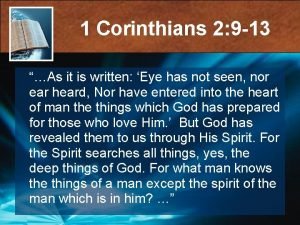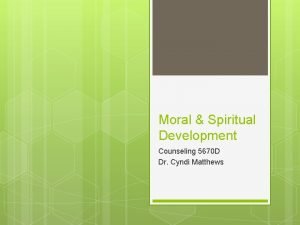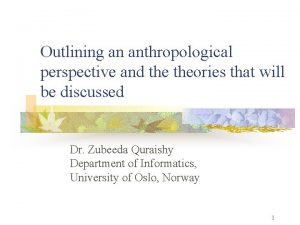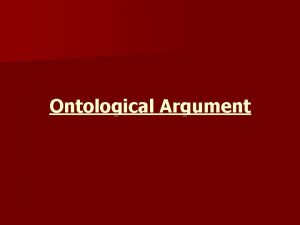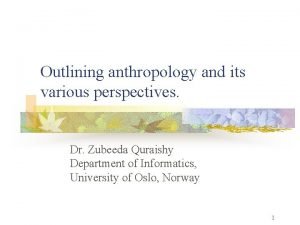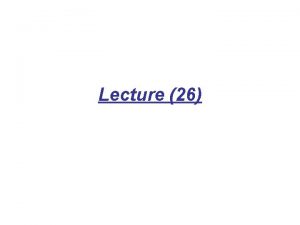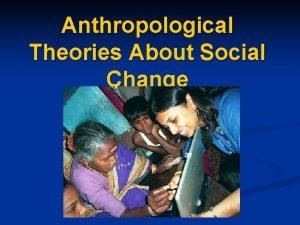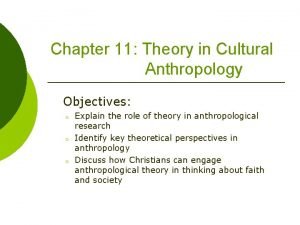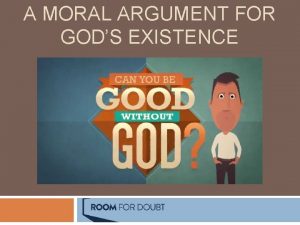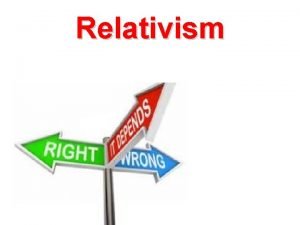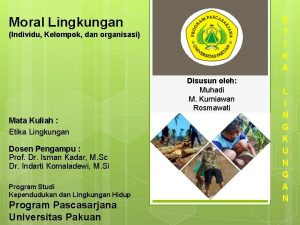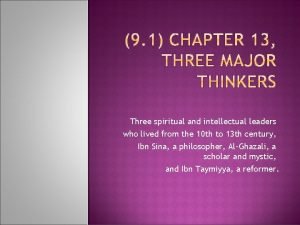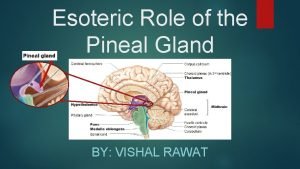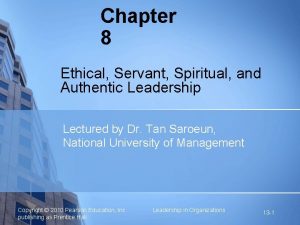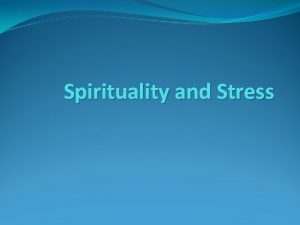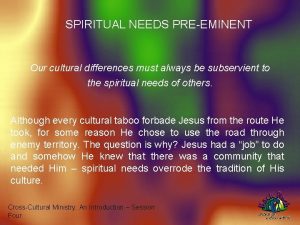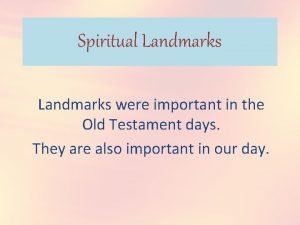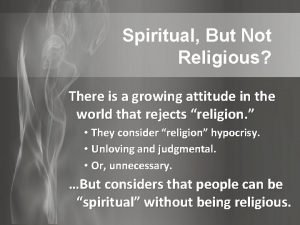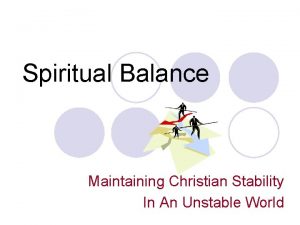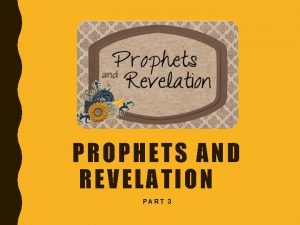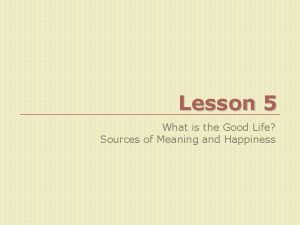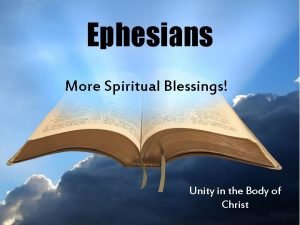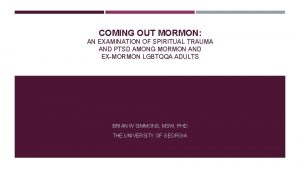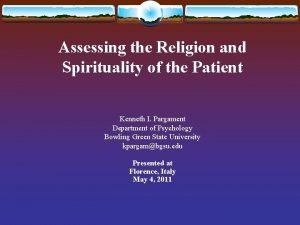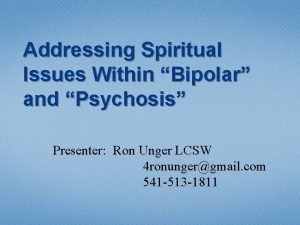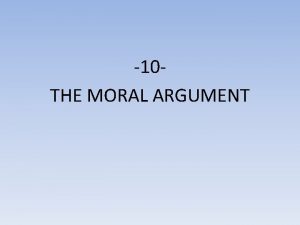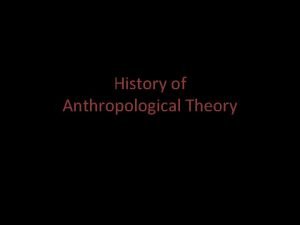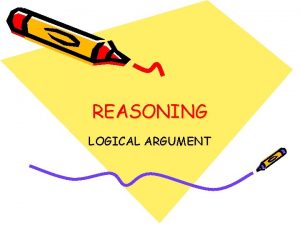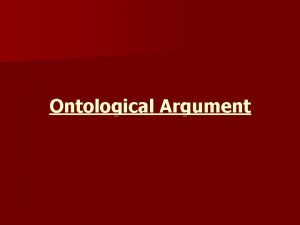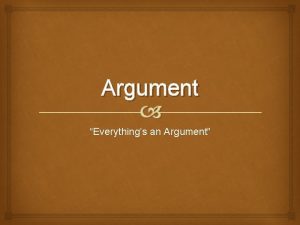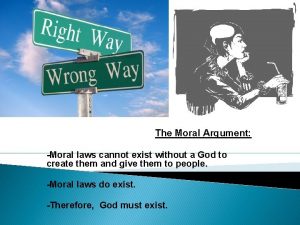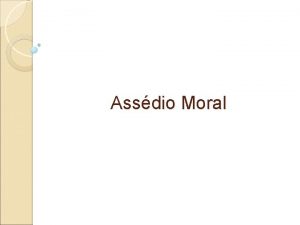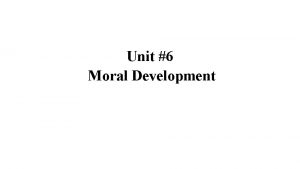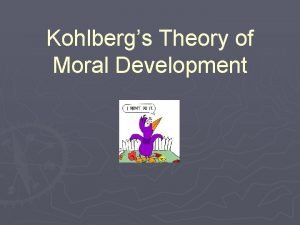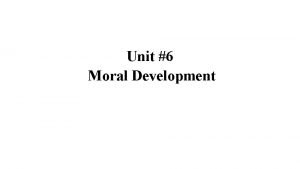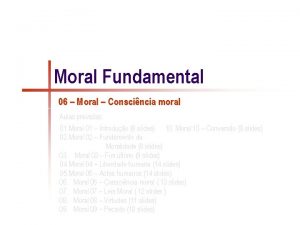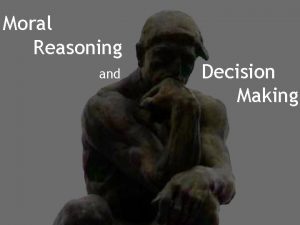A Anthropological Argument We are spiritual and moral










































- Slides: 42



A Anthropological Argument We are spiritual and moral beings. The Bible teaches that we were created that way. Genesis 1: 26, 27— “Then God said, ‘Let us make man in our image, in our likeness, and let them rule over the fish of the sea and the birds of the air, over the livestock, over all the earth, and over all the creatures that move along the ground. ’ So God created man in his own image, in the image of God he created him; male and female he created them. ”


A Anthropological Argument The impulse to worship something greater than ourselves is found in all human societies. When the apostle Paul first preached the gospel in Athens, he started like this: “Men of Athens! I see that in every way you are very religious. For as I walked around and observed your objects of worship, I even found an altar with this inscription: TO AN UNKNOWN GOD. Now what you worship as something unknown I am going to proclaim to you. ” (Acts 17: 22, 23)

A For every other “need” that we feel, something exists that can meet that need. For example: • If we feel hungry. . . we can find food! • If we feel thirsty. . . we can find a drink! • If we feel lonely. . . we can find other people! • If we feel tired. . . we can sleep! So then, if human beings everywhere also feel a “need” to worship and depend on someone higher than ourselves. . . isn’t it reasonable to suppose that there is a God who will meet that need?

A Human beings everywhere show that they have a moral nature. All societies have something to say about such things as: — murder — sexual morality — honesty — kindness to the needy — family obligations, etc. The apostle Paul spoke about this fact: “Indeed, when the Gentiles, who do not have the law, do by nature things required by the law, they are a law for themselves, even though they do not have the law, since they show that the requirements of the law are written on their hearts. . ”

A The gospel of Jesus Christ meets the spiritual needs of people everywhere. Jesus commanded that his followers reach out to every ethnic group: “All authority in heaven and on earth has been given to me. Therefore go and make disciples of all nations, baptizing them in the name of the Father and of the Son and of the Holy Spirit, and teaching them to obey everything I have commanded you. And surely I will be with you always, to the very end of the age. ” (Matthew 28: 18 -20)

A The gospel of Jesus Christ meets the spiritual needs of people everywhere. The Bible looks forward to the time when people from every ethnic group will worship God: “And they sang a new song: ‘You are worthy. . . because you were slain, and with your blood you purchased men for God from every tribe and language and people and nation. ’ ” (Revelation 5: 9)

B Biblical Argument The Bible, which claims to be the Word of God, is an amazing book. The apostle Paul wrote: “All Scripture is God-breathed and is useful for teaching, rebuking, correcting and training in righteousness, so that the man of God may be thoroughly equipped for every good work. ” (2 Timothy 3: 16, 17)

B Biblical Argument The Bible is actually a library of 66 books, written by some 40 authors from a variety of walks of life, on three different continents, over a period of at least 1500 years. Yet there is amazing harmony among all the books of the Bible. The central theme of the Bible is that there is a God who has created the world and humankind, and who wants to draw us into relationship to himself.

B Biblical Argument The central figure of the Bible is the Lord Jesus Christ: a man who claimed that he himself was God. To back up this claim, Jesus gave powerful teaching, and did many mighty miracles, including raising himself from the dead! Jesus’s followers testified to having seen him alive after he was killed by being nailed to a wooden cross, and his followers were willing to be put to death themselves rather than deny the truth about the living Saviour!

Here is an example of an early sermon preached by one of Jesus’s followers (Peter): “I now realize how true it is that God does not show favoritism but accepts men from every nation who fear him and do what is right. This is the message God sent to the people of Israel, telling the good news of peace through Jesus Christ, who is Lord of all. You know what has happened throughout Judea, beginning in Galilee after the baptism that John preached — how God anointed Jesus of Nazareth with the Holy Spirit and power, and how he went around doing good and healing all who were under the power of the devil, because God was with him. . ”

(The apostle Peter continues. . . ) “We are witnesses of everything he did in the country of the Jews and in Jerusalem. They killed him by hanging him on a tree, but God raised him from the dead on the third day and caused him to be seen. He was not seen by all the people, but by witnesses whom God had already chosen — by us who ate and drank with him after he rose from the dead. He commanded us to preach to the people and to testify that he is the one whom God appointed as judge of the living and the dead. All the prophets testify that everyone who believes in him receives forgiveness of sins through his name. ” (Acts 10: 34 -43)

The fundamental question of philosophy: “How does it happen that there is something rather than nothing? ” — as phrased by French philosopher Jean-Paul Sartre (1905 -1980) ?

One man’s answer: “This most beautiful system of the sun, planets, and comets, could only proceed from the counsel and dominion of an intelligent and powerful being. ” — Sir Isaac Newton (1642 -1727)

C Cosmological Argument (Also known as the Argument from “First Cause”) The existence of such a huge, awesome universe (or “cosmos”) requires an explanation. The cause of this universe must be at least as huge and awesome as the universe itself.

Bertrand Russell was an atheistic philosopher (he didn’t believe in God). He claimed that the Cosmological Argument wasn’t “valid” (i. e. , that it wasn’t properly derived from accepted premises by the rules of logic). Russell said: “If everything must have a cause, then God must have a cause. If there can be anything without a cause, it may just as well be the world as God, so that there cannot be any validity in that argument [the Cosmological Argument]. ”

Three possibilities Something came from nothing. Something is eternal. God Matter/ energy

The Second Law of Thermodynamics 1. “Natural processes occur in a certain direction, not in any direction. ” E. g. , a cup of hot coffee does not get hotter in a cooler room (concept of “Time’s Arrow”)

The Second Law of Thermodynamics 2. “Entropy increases. ” Natural processes tend to produce greater “randomness” or “disorder. ”

The Second Law of Thermodynamics 3. “Energy becomes less useful. ” In any natural process, some energy is transformed into heat (“thermal energy”), at least part of which will be unavailable to do work (“waste energy”).

The Second Law of Thermodynamics 4. “Information becomes degraded. ” Manipulation/transmission of data by a communicating system results in loss (never gain) of information.

Quote from Theodosius Dobzhansky (leading evolutionary geneticist; author of Genesis and the Origin of Species; contributor to the Neo-Darwinian Synthesis) “One of the greatest thinkers of our age, Pierre Teilhard de Chardin, wrote the following: ‘Is evolution a theory, a system, or a hypothesis? It is much more—it is a general postulate to which all theories, all hypotheses, all systems must henceforward bow and which they must satisfy in order to be thinkable and true. Evolution is a light which illuminates all facts, a trajectory which all lines of thought must follow—this is what evolution is. ’ ” (from the concluding paragraph of the famous article, “Nothing in Biology Makes Sense Except in the Light of Evolution. ” The American Biology Teacher 35[3]: 129, March, 1973)

Quote from Julian Huxley (noted biologist; leading atheistic humanist; grandson of Thomas Henry Huxley [“Darwin’s bulldog”]; first director general of UNESCO) “Evolution in the extended sense can be defined as a directional and essentially irreversible process occurring in time, which in its course gives rise to an increase of variety and an increasingly high level of organization in its products. Our present knowledge indeed forces us to the view that the whole of reality is evolution—a single process of self-transformation. ” (from “Evolution and Genetics. ” In J. R. Newman [ed. ] 1955. What is Science? New York: Simon and Schuster. p. 278.

Evolutionists will claim that they can dodge the “Second Law” problem because the Earth is an “open system. ” But this is insufficient! Conditions for increasing complexity must include: 1. Open system (able to exchange matter and energy with the surroundings) 2. Available energy (to power chemical reactions) — e. g. , radiation from sun 3. Program (to direct growth in complexity) — e. g. , genetic code in DNA of organisms, or plans and specifications for construction of an artificial system 4. Harnessing mechanism (for converting, storing, and using energy) — e. g. , photosynthesis in plants, or metabolism in animals (and plants), or machinery in artificial construction

A B C Review: Anthropological Argument Biblical Argument Cosmological Argument

D Design Argument (Also known as the “Teleological Argument”) The universe, the Earth, the human body, and the bodies of animals are all amazingly well-designed! King David said: “The heavens declare the glory of God; the skies proclaim the work of his hands. ” (Psalm 19: 1)

D Design Argument (Also known as the “Teleological Argument”) Again, King David said: “You created my inmost being; you knit me together in my mother’s womb. I praise you because I am fearfully and wonderfully made; your works are wonderful, I know that full well. ” (Psalm 139: 13, 14)

D Design Argument (Also known as the “Teleological Argument”) And another psalm says: “How many are your works, O LORD! In wisdom you made them all; the earth is full of your creatures. ” (Psalm 139: 13, 14)

Quote from Richard Dawkins (Oxford zoologist; world’s leading atheist and evolutionist) “Biology is the study of complicated things that give the appearance of having been designed for a purpose. ” (Richard Dawkins. 1987. The Blind Watchmaker. New York: W. W. Norton & Company. p. 1) Quote from Francis Crick (Nobel laureate; with James Watson elucidated structure of DNA molecule) “Biologists must constantly keep in mind that what they see was not designed, but rather evolved. ” (Francis Crick. 1988. What Mad Pursuit. New York: Basic. Books. p. 138. )

As people (including scientists) look around them, they see amazing beauty and good design. But then they try to deny that good design means there had to be a Good Designer! It’s just as the apostle Paul said: “Since the creation of the world God’s invisible qualities — his eternal power and divine nature — have been clearly seen, being understood from what has been made, so that men are without excuse. ” (Romans 1: 20)

Quote from Robert Boyle (the “father of modern chemistry”) “That the consideration of the vastness, beauty, and regular motions of the heavenly bodies; the excellent structure of animals and plants; besides a multitude of other phenomena of nature, and the subserving of most of these to man; may justly induce him as a rational creature, to conclude, that this vast, beautiful, orderly, and (in a word) many ways admirable system of things, that we call the world was framed by an Author supremely powerful, wise and good, can scarce be denied by an intelligent and unprejudiced considerer. ” (as cited in E. A. Burtt. 2003. The Metaphysical Foundations of Modern Science. Mineola, NY: Dover Publications. p. 195)

Quote from Karl von Linné (Carolus Linnaeus) (inventor of the modern binomial system of biological classification) “Mankind, as well as all other creatures, being formed with such exquisite and wonderful skill that human wisdom is utterly insufficient to imitate the most simple fibre, vein, or nerve, much less a finger, it is perfectly evident, that all these things must originally have been made by an omnipotent and omniscient Being, for ‘He who formed the ear, shall He not hear; and He who made the eye, shall He not see? ’ ” (from The Study of Nature, translated by Sir James Edward Smith. Cited in Dagobert D. Runes. 1955. Treasury of Philosophy. New York: The Philosophical Library. p. 718. )

Quote from Antony Flew (one of the world’s leading atheists for over 50 years!) “. . . biologists’ investigation of DNA has shown, by the almost unbelievable complexity of the arrangements needed to produce life, that intelligence must have been involved. . But there is no law of nature that instructs matter to produce end-directed, self-replicating entities. . The only satisfactory explanation for the origin of such ‘end-directed, self-replicating’ life as we see on earth is an infinitely intelligent Mind. ” (Antony Flew. 2007. There is a God: How the world’s most notorious atheist changed his mind. New York: Harper. Collins. pp. 123, 131 f. )

Quote from Daniel Dennett (evolutionary philosopher, Tufts University) “There is simply no denying the breathtaking brilliance of the designs to be found in nature. Time and again, biologists baffled by some apparently futile or maladroit bit of bad design in nature have eventually come to see that they have underestimated the ingenuity, the sheer brilliance, the depth of insight to be discovered in one of Mother Nature’s creations. Francis Crick has mischievously baptized this trend in the name of his colleague Leslie Orgel, speaking of what he calls ‘Orgel’s Second Rule: Evolution is cleverer than you are. ’ ” (Daniel Dennett. 1995. Darwin’s Dangerous Idea. New York: Simon and Schuster. p. 74)

E Experiential Argument People who try to live apart from God often experience guilt, meaninglessness, purposelessness, and hopelessness. But those who come to God by accepting the work of the Lord Jesus Christ on the cross receive joy, peace, and spiritual freedom! As the apostle Paul said: “Therefore, since we have been justified through faith, we have peace with God through our Lord Jesus Christ, through whom we have gained access into this grace in which we now stand. ” (Romans 5: 1, 2)

The Bible encourages you to. . . Experience God for yourself! “Taste and see that the LORD is good; blessed is the man who takes refuge in him. ” (Psalm 34: 8) Jesus said: “If anyone chooses to do God’s will, he will find out whether my teaching comes from God or whether I speak on my own. ” (John 7: 17) Jesus also said: “Come to me, all you who are weary and burdened, and I will give you rest. ” (Matthew 11: 28)

A B C D E Review: Anthropological Argument Biblical Argument Cosmological Argument Design Argument Experiential Argument

F Followers of Christ How good an argument are we? ?

Some who said they believed in God were not such a good argument for his reality. As the apostle Paul said: “You who brag about the law, do you dishonor God by breaking the law? As it is written, ‘God’s name is blasphemed among the Gentiles because of you. ” (Romans 2: 23, 24) And Jesus said: “Not everyone who says to me, ‘Lord, ’ will enter the kingdom of heaven, but only he who does the will of my Father in heaven. ” (Matthew 7: 21)

The Bible exhorts us to live appropriately, as representatives of the God who is real. Jesus said: “Let your light shine before men, that they may see your good deeds and praise your Father in heaven. ” (Matthew 5: 16) And Peter said, similarly: “Live such good lives among the pagans that, though they accuse you of doing wrong, they may see your good deeds and glorify God on the day he visits us. ” (1 Peter 2: 12)
 Antigentest åre
Antigentest åre Anthropological argument
Anthropological argument 1 corinthians 2:9-13
1 corinthians 2:9-13 Moral/spiritual reflective
Moral/spiritual reflective Anthropological perspective
Anthropological perspective Teleological vs ontological
Teleological vs ontological Example perspective of anthropology
Example perspective of anthropology Mandible x ray positioning towne's
Mandible x ray positioning towne's Orbito meatal baseline
Orbito meatal baseline Waters view x ray
Waters view x ray Anthropological background of bangladesh
Anthropological background of bangladesh Social change in anthropological perspective
Social change in anthropological perspective Anthropological materialism
Anthropological materialism Bambrough moral scepticism and moral knowledge download
Bambrough moral scepticism and moral knowledge download Moral argument for god's existence
Moral argument for god's existence Moral relativism vs moral universalism
Moral relativism vs moral universalism Moral individu dan moral kelompok
Moral individu dan moral kelompok Moral de esclavos y moral de señores
Moral de esclavos y moral de señores The intellectual and spiritual leaders
The intellectual and spiritual leaders Nepali cultural and spiritual center
Nepali cultural and spiritual center Pituitary gland and pineal gland spiritual
Pituitary gland and pineal gland spiritual អភិសមាចា
អភិសមាចា What is a spiritual person
What is a spiritual person Work song blues
Work song blues Spiritual health definition
Spiritual health definition It fulfills the spiritual needs of a culture.
It fulfills the spiritual needs of a culture. Ancient path
Ancient path Spiritual gifts romans 12
Spiritual gifts romans 12 Lesson on spiritual gifts
Lesson on spiritual gifts What are the 7 spiritual gifts
What are the 7 spiritual gifts Spiritual person definition
Spiritual person definition How to maintain spiritual stability
How to maintain spiritual stability Artists create art to express personal feelings.
Artists create art to express personal feelings. Acquiring spiritual knowledge part 1
Acquiring spiritual knowledge part 1 What are the 7 spiritual gifts
What are the 7 spiritual gifts Nothing in this world can fill the spiritual vacuum within
Nothing in this world can fill the spiritual vacuum within Spirtual usernames
Spirtual usernames Sunday spiritual blessings
Sunday spiritual blessings Ptsd spiritual warfare
Ptsd spiritual warfare Spiritual acceleration
Spiritual acceleration Spiritual v religious
Spiritual v religious Adhd spiritual gift
Adhd spiritual gift Ron unger lcsw
Ron unger lcsw


